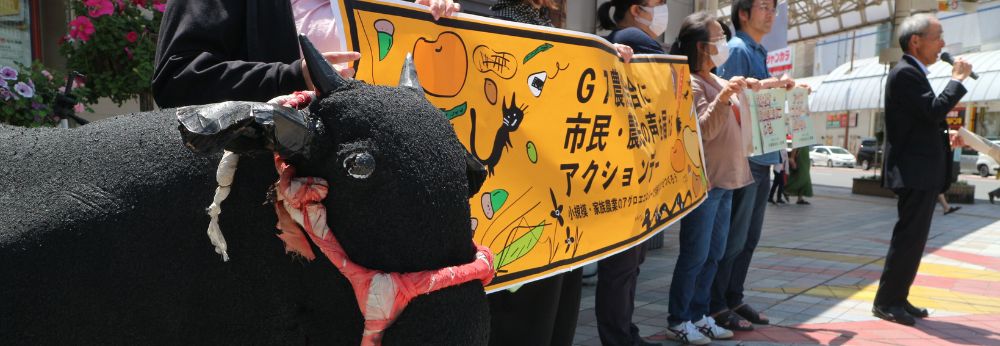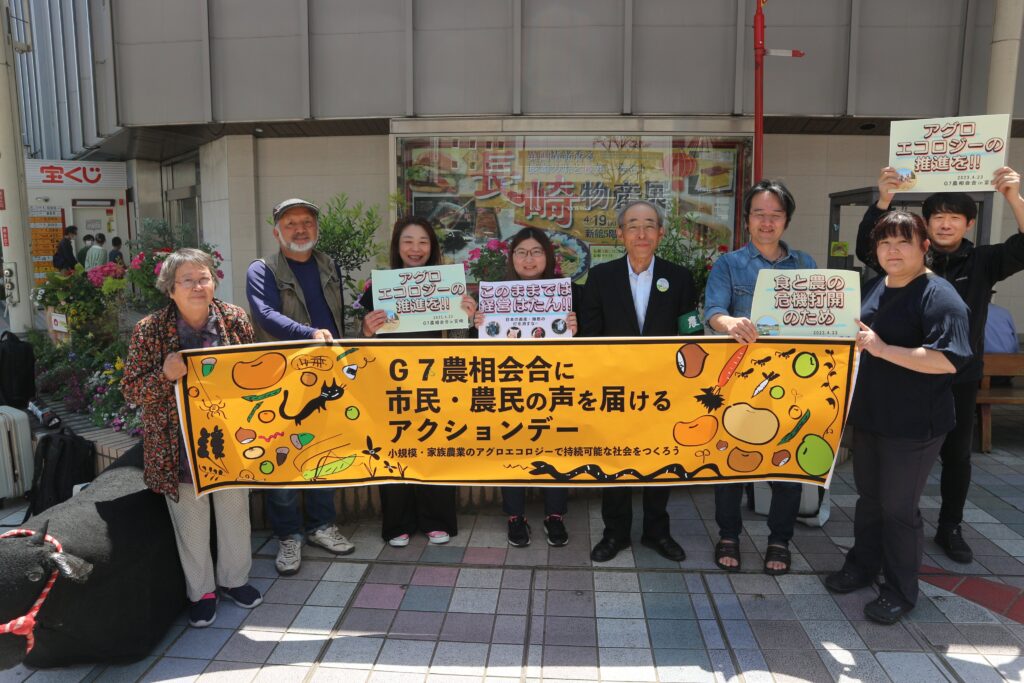‘Amendments to Agricultural Law would derail food self-sufficiency goals’: Nouminren, JAPAN

The National Legislature of Japan (also referred to as the National Diet) is currently deliberating on the revision of the Basic Agricultural Law. The move will mark the first full-scale revision to the basic law that governs agriculture policy, since its enactment in 1999.
These debates are taking place amidst the supply disruptions induced by the climate crisis and the ongoing wars and conflicts – leading to a situation that the UN has referred to as the world’s worst hunger crisis.
Peasant movements in Japan, such as the family farmers’ movement Nouminren (a member of La Via Campesina), argue that these amendments would be counterproductive to the proclaimed governmental goal to improve self-sufficiency.
Since the 1960s, Japan’s food self-sufficiency rates have steadily declined. Nouminren points out that years of progressive liberalization and market reforms have led to increased dependency on agricultural imports. For instance, Japan’s grain production declined from 82% in the 1960s to a mere 29% by 2022. National meat production slid from 91% to 53% during the same period. Similar trends can be seen across other farm produce (see the chart).

Approximately 90% of the fertilizers, animal feed, vegetable seeds, and petroleum required for agricultural production are imported. If these cannot be imported, the self-sufficiency rate drops to 10%, they points out.
They have also pointed out that through amendments, attempts are being made to downgrade self-sufficiency targets. The onus of improving self-sufficiency, the movement alleges, is also being shifted from the State to the citizens. In times of food crisis, the proposed amendments would invoke the Emergency Food Supply Law (Food Supply Difficulty Response Law), wielding penalties to farmers for crop conversion (from flowers/grass to potatoes) and imposing “allocation and distribution” of food on citizens. During “particularly severe stages,” producers could be instructed to shift to calorie-focused production (potatoes, rice) with fines of up to 200,000 yen for non-compliance.
The policy pursued by the Kishida administration, Nouminren warns, aligns with the “creation of a country prepared for war,” echoing the “wartime food law,” which mandates forcibly producing potatoes on farms and having the populace endure hunger by eating potatoes.
While the current Basic Law states the need to “increase domestic agricultural production as a basic principle, and to appropriately combine this with imports and stockpiling,” Japan has continued to neglect increasing domestic agricultural production and has pursued further importation and liberalization.
The amendments explicitly establish a clause for “ensuring stable imports” and even advocate for increasing imports by promoting investment and support to source countries.
On the other hand, as Japan faces population decline, promoting the export of agricultural products is seen as opening up prospects for agriculture, and a strong commitment to exports is declared. Nouminren disagrees. The government boasts about the “surpassing 1 trillion yen in agricultural, forestry, and fishery product exports,” but the total amount of imported agricultural, forestry, and fishery products is vastly different at 13 trillion yen. In times of crisis, relying on exported agricultural products is not at all reliable, they say.
Urgent Need for Support for Young Small-scale Farmers – Robot Farms, Lab Meats are not the Solution:
The aging peasant population is a pressing issue, with 240,000 farmers in Japan being under the age of 59 (20%), while those aged 75 and above number 420,000. Moreover, 70% of farmers have no successors. While the government states that over the next 20 years, the number of agricultural workers will decrease from the current 1.2 million to 300,000 measures to secure young successors have been neglected.
The government’s measures outlined in the revision proposal include: 1. Utilizing robots, drones, and AI (artificial intelligence) in “robot farming” instead of farmers, and 2. Encouraging the public to consume insects, genetically modified/genome-edited foods, and artificial meat.
“Robot farming” without farmers and forcing people to eat insects and artificial meat in addition to three meals of potatoes a day—such methods cannot overcome the crisis.
It only serves to make food a tool for the profits of large corporations.
Strengthening Price Support and Direct Income Compensation: ‘Defend Family Farms’
In overcoming the crisis in agriculture and the shortage of farmers, realizing prices that match production costs is crucial. However, the hourly wage of an average rice farmer is a mere “10 yen.”
Facing the increasing number of people who can only afford one to two meals a day and rising prices, Nouminren has proposed a set of four points: “price support + price transfer + direct income compensation + public procurement,” demanding that the government guarantee incomes that allow people to live in rural areas.
However, the proposed amendments vehemently refuse to implement price support and income compensation that entail financial burdens commonly seen in the US and EU to cover farmers’ deficits, and it has also postponed the legislation of price transfer that was supposed to be considered.
Nouminren ironically points out that we are currently in the midst of the United Nations’ “Decade of Family Farming.” In line with this period, a shift in politics is required to nurture successors, allow family-run farms to thrive, and improve self-sufficiency rates.
Some proponents suggest that details can be included in the basic plan after the revision of the basic law, but Nouminren has warned that it will be too late once the revisions ensure abandonment of the goal to improve the self-sufficiency rate.

In a detailed analytical blog and petition posted on their website, Nouminren has demanded the abolition of the government’s proposed amendments and has called for joint action between social movements, political parties, and citizen groups, strengthening solidarity between consumers and producers, to seek a basic law that truly contributes to the revival of food, agriculture, and rural areas. To step up food production, they have demanded an end to massive military expansion and a doubling of the extremely low agricultural budget compared to other countries.
This post is also available in Français.
